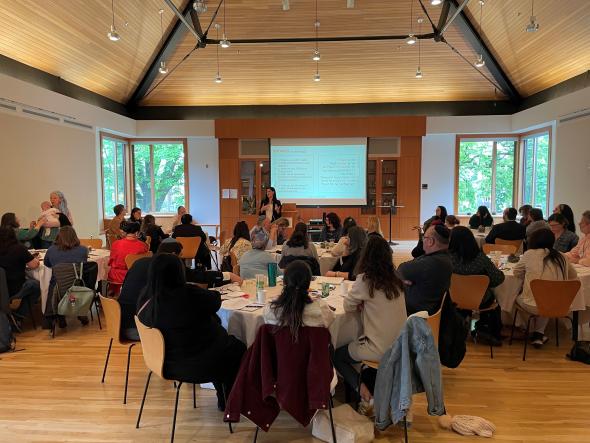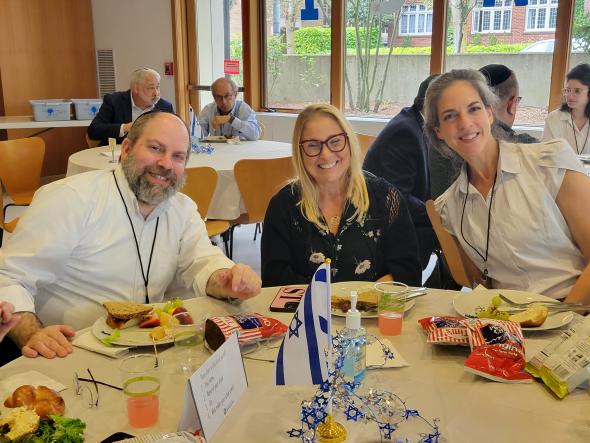Not long ago, Hebrew at the Center (HATC) leadership conducted a series of conversations with Hebrew teachers, Judaic studies coordinators and heads of schools at several schools in the Pacific Northwest, and then shared what was heard with community leaders and funders. Out of those conversations, and the relationships and idea-sharing that resulted from those meetings, a new idea emerged that can become a revolutionary model inspiring the advancement of Hebrew language learning in Jewish day schools across North America: Think regionally, leverage resources communally, and act locally.
On average, just 13% of day school staff are Hebrew teachers, and four hours a week are spent on Hebrew language instruction. Many of these teachers have limited access to high-quality professional learning and may not have the academic credentials or training in the 10 competency areas needed to be an effective Hebrew language instructor. This is particularly true for smaller schools or schools located outside of major Jewish communities, centers more likely to host academic or communal institutions that can provide this type of training or support in Hebrew language instruction.
Despite being committed to their students and the students’ learning, Hebrew teachers often report feelings of isolation and aren’t certain to whom they can turn. School leaders echo this feeling, knowing where to send teachers of math or social science for professional learning and mentoring, but being less certain how to support Hebrew instructors. Central to professional growth of Hebrew teachers and, in turn, to improved student outcomes in Hebrew, is being a part of a meaningful community of practice, the ability to grow their instructional expertise, and a well-articulated pathway for personal and professional advancement. The absence of these fundamental frameworks of support lead to teacher attrition at a time when talent pipeline issues are already critically challenging.
Forging a Regional Hebrew Hub
When HATC leadership visited the communities of Portland, Seattle and Vancouver as part of a regional “listening tour,” teachers and school leaders repeatedly surfaced that the Hebrew faculty often are underserved when it comes to advancing their pedagogic expertise or elevating student outcomes. School leaders also raised significant concerns related to the talent pipeline for Hebrew educators in these communities, mirroring concerns throughout the field. However, each school and each community understood the limits to solving this issue on their own, whether the solution was finding Hebrew speakers and training them to become Hebrew teachers, or supporting existing staff with local professional learning opportunities to encourage growth and strong teacher retention.
In response, arising from requests made by Hebrew teachers themselves, a regional professional learning was envisioned that would serve the day schools of Portland, Seattle and Vancouver. Titled Cascadia in recognition of the mountain range running through the region, the goal of the project is to strengthen Hebrew programs and advance student outcomes and teacher professionalization through a partnership among the participating Jewish day schools and local funders. This initiative also will create dynamic connections across the community of teachers and, by extension, the way in which their students and families see themselves as part of a greater whole.
Having day school teachers and leaders from each of these three cities working both together and in parallel reinforces a sense of belonging to a more robust, dynamic community. As shared by Marc Blattner, president and CEO of the Jewish Federation of Greater Portland, “We believe this effort will not only help us locally, but also bring the Pacific Northwest Jewish educational initiatives closer together for the first time.” In total, a dozen schools from an array of religious and communal affiliations have joined the initiative, including Seattle’s Jewish Day School of Metropolitan Seattle, MMSC Day School, Northwest Yeshiva High School, Seattle Hebrew Academy and Seattle Jewish Community School; Portland’s Maayan Torah Day School, Portland Jewish Academy and the Tamim Academy of Portland; and Vancouver’s King David High School, Richmond Jewish Day School, Vancouver Hebrew Academy and Vancouver Talmud Torah.
Thanks to grant requests organized in partnership with Hebrew at the Center and submitted by these schools, more than $365,000 has been pledged for the two-year initiative through funding from the Samis Foundation, Jewish Federation of Greater Portland, the Oregon Jewish Community Foundation, the Jewish Federation of Greater Vancouver, professional learning grants from Hebrew at the Center and financial contributions from each of the schools.







